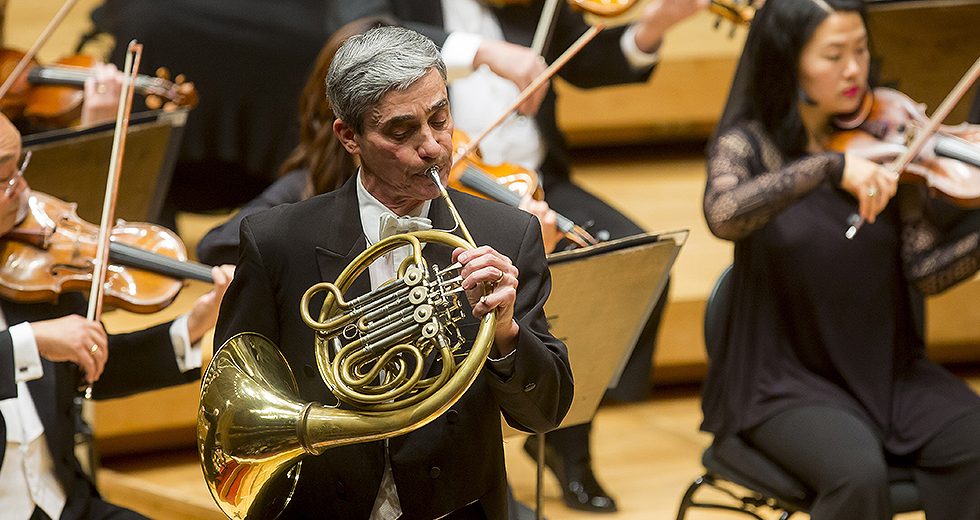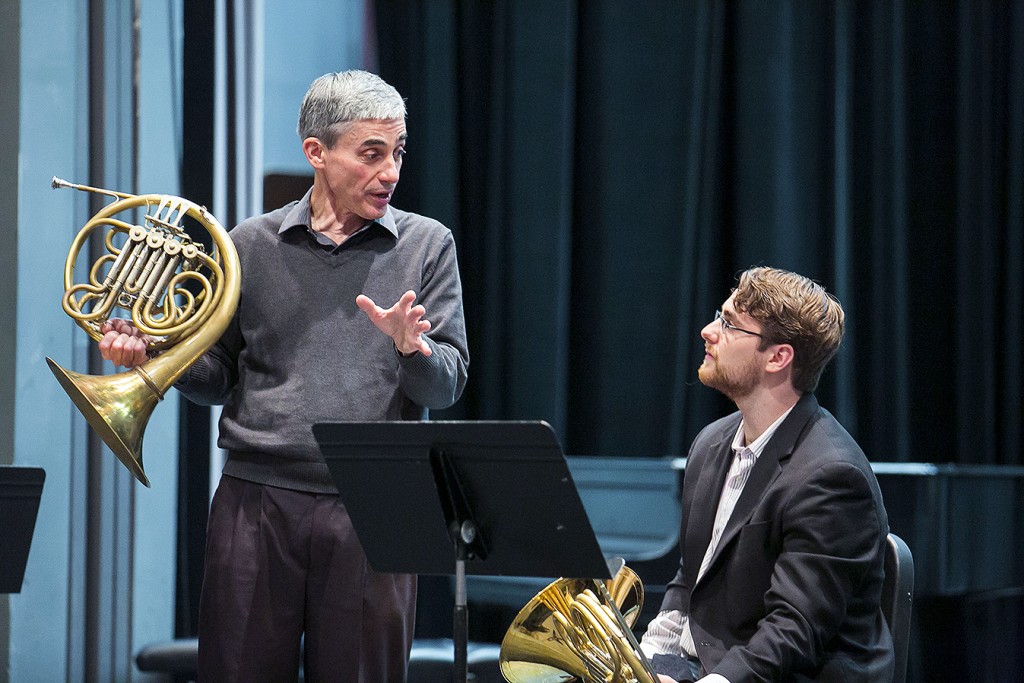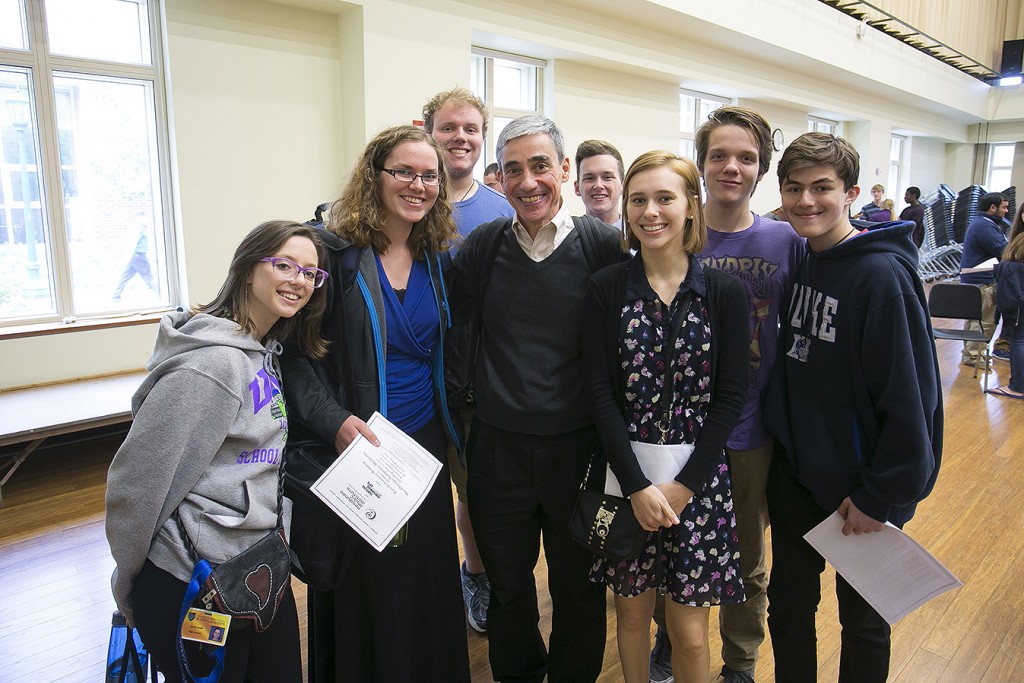
The inherent danger of wavering intonation and off-color sounds can make the French horn a particularly difficult instrument to play. “Even when things are going as well as they can go, you’re just a hair’s breadth away from disaster,” said Daniel Gingrich, the Chicago Symphony Orchestra’s acting principal horn. Because of the instrument‘s construction, with its long, narrow metal tubing, there is little margin for error. “I’m not totally used to it, but it [this difficulty] comes with the territory. We’re [horn players] all a little crazy, I think.”
All kidding aside, Gingrich long ago mastered the unique challenges of the instrument, quickly becoming an anchor of the CSO’s vaunted horn section after his arrival in 1975. Steadily moving through the ranks from assistant utility horn to fourth and then third horn, he was appointed the CSO’s associate principal horn in 2002. Since 2013, he has served as acting principal horn.
Gingrich will be front and center June 2-7 when he will be the soloist in Mozart’s Horn Concerto No. 3, under guest conductor Christoph von Dohnányi. “It’s a fun one,” he said. “It’s the most melodic of the E-flat concertos by Mozart, of which there are three.”

Acting principal horn Daniel Gingrich discusses technique with a student during a master class conducted on the CSO’s U.S. fall 2015 tour. | © Todd Rosenberg Photography 2015
This will be his second time in the spotlight; he performed another of Mozart’s horn concertos with the orchestra in 2006. Will he have butterflies? “Oh, sure,” he said with a chuckle. “All kinds of friends and relatives who haven’t heard me play in 40 years are going to come.”
Gingrich grew up in Stickney, a southwest suburb of Chicago, and his first encounter with a brass instrument came when his older brother entered third grade and started to play the trumpet. “He brought it home and he was very proud and showed the whole family how the thing worked,” he said. “Then I couldn’t keep my hands off it after that even though I was younger.” So Gingrich’s father stopped at a pawn shop on the way home from work one day and bought young Daniel a $15 mellophone, a relative of the French horn usually used in marching bands. So eager was Gingrich to play the instrument that his elementary-school band director allowed him to join the ensemble, even though he was just in first grade.
The following year, he switched to French horn, and it has been his instrument ever since. “For my birthday, my parents got me a brand-new, shiny French horn, and I was disappointed as could be, because I really loved the mellophone,” Gingrich said with a laugh. He started taking private lessons with his band director and later switched to Richard Oldberg, a member of the Chicago Symphony Orchestra at the time.
In his sophomore year of high school, Gringrich was invited by a friend studying French horn at Roosevelt University to attend a CSO concert. “It was Good Friday, so we either had the day off or the afternoon off, but we came down, and [Georg] Solti was conducting Mahler’s Second, and I was blown away. I thought, ‘Wow, I’d really like to do this.’” His dream immediately became to perform in the Chicago Symphony Orchestra, something he would accomplish just six years later.
From 1969 through 1971, when Gingrich graduated from high school, he played with the Chicago Youth Orchestra. Almost concurrently in 1969-72, he was a member of the Civic Orchestra of Chicago, the CSO’s pre-professional training ensemble. After graduation, he attended what is now known as the Chicago College of Performing Arts at Roosevelt University. During his sophomore year, when he was only 19 years old, he auditioned for the Rochester (N.Y.) Philharmonic to get some experience with the try-out process. To his surprise, Gingrich was offered a post in the orchestra, and he decided to leave school early and accept. His appointment in January 1973 launched him on an unusually quick professional trajectory; he moved to the National Symphony Orchestra in Washington, D.C., the following year and auditioned for the Chicago Symphony that October. “When that audition came up, I had to take that one,” he said. “I figured I’d take a shot at it like I had taken a shot at everything else.”

After participating in master classes, University of North Carolina students pose with the CSO’s acting principal horn Dan Gingrich. | © Todd Rosenberg Photography 2015
He was one of two finalists. The second round of auditions was derailed by an ice storm. So they didn’t happen until April 1975, and Gingrich got the job as an assistant utility horn. “Unlike most other sections of the orchestra, we actually use assistants onstage to play assistant first [chair],” he said. “A lot of first-horn parts are very physically demanding, and the results are just better if you have somebody else there to do some of the heavy lifting.” Gingrich played under Dale Clevenger, the CSO’s longtime principal horn, who had overseen rehearsals of the French horn section during the years that Gingrich was with the Civic Orchestra.
Despite performing in two well-regarded orchestras for a little over two seasons, Gingrich recalled that the shift to the CSO was a big transition. “This orchestra has a sense of tradition and a unity in the brass section,” he said. “There was really no comparison. There were good players in the other orchestras but not the focused musical unity that we have here. That was a huge difference.” But the change was fun as it was challenging. “I had to pinch myself to make sure it wasn’t really a dream, but it was a dream come true.”
Gingrich has played under three very different music directors in Chicago. During Solti’s tenure, when the CSO had an extensive recording schedule, the maestro’s podium stance seemed to reflect that pace. “His conducting was more energetic,” Gingrich said. “’Fiery’ is the word that comes to mind. Very exacting and always inspired.” Gingrich describes Daniel Barenboim, music director in 1991-2006, as a genius. Stagehands time performances, he said, and Solti’s timings for works were often within three or four seconds of each other from night to night. “With Barenboim, it could change drastically,” Gingrich said. “He sought his inspiration in the moment, and you had to stay awake and on the edge of your seat. It was an entirely different sort of music-making, but it was great to experience both.”
Since 2010, the orchestra has been overseen by Riccardo Muti, who Gingrich believes is the top conductor in the world today. The Italian maestro brings a sense of beauty, grace and balance to his direction. “Everything feels sung,” Gingrich said. “It’s very heartfelt.”
Given these changes in conductors, the orchestra has inevitably evolved during Gingrich’s tenure. “The sound has changed,” he said. “There was harshness under Solti, but it was a matter of contrasts — huge contrasts. The orchestra took on a more human sound with Barenboim, and now it’s heavenly.”
Kyle MacMillan, former classical music critic of the Denver Post, is a Chicago-based arts journalist.
TOP: Daniel Gingrich takes a solo turn in Mozart’s Horn Concerto No. 3, performed June 2 under Edo de Waart. | Todd Rosenberg Photography 2016